Ones to Watch: Thomas Mitchell x SnkTrd
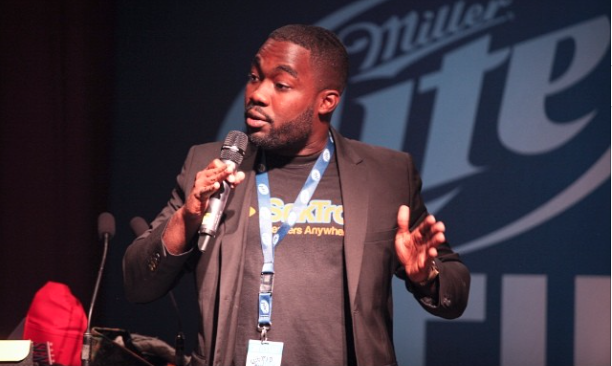
Recently winning $20K in Miller Lites’ Tap the Future startup competition, Thomas Mitchell knows a thing or two about the billion-dollar sneaker industry. As an active member of the sneaker culture since a teenager, Snktrd (Sneaker + Trade) was founded in 2011 after Thomas’ personal frustration with having eight plus tabs open searching the web for sneakers. “It is my goal to create a space online where sneakerheads can co-exist in one space for hours.”
The Spill: SnkTrd (pronounced “Sneak + Trade”)
The free and easy to join platform allows member to shop brands from Nike to classic Reeboks, with confidence knowing that all payments are secured and products are authentic, as SnkTrd checks the authenticity and conditions before it arrives at your doorstep. In addition, SnkTrd also integrates a daily digital magazine that feeds members with new sneaker releases, trends, and pop culture news keeping users up-to-date without scouring the web for endless hours.
We would be doing a disservice if we didn’t mention that Thomas runs SnkTrd while working full time and attending college. He is proof of success as the result of determination and a tireless work ethic.
Name: Thomas Mitchell
Age: 26
Location: Temple Hills, MD
Current Title/Company: CEO x SnkTrd
Educational Background: BS of Political Science – University of Maryland University College
What sparked Snktrd?
I noticed on Instagram how people were monetizing trading sneakers by charging people anywhere from $0.50 to $1 to post and sell their sneakers. Once I saw how this was happening, I thought why hasn’t anyone created a sneaker community specifically for trading sneakers. Initially I wanted to create a Craigslist for sneakers, then there was the Facebook group, until eventually I decided to create a single platform that offered all these options.
http://youtu.be/xLc1nMu8Ciw[iframely]http://iframe.ly/bFkV[/iframely]
What was your first step after deciding you wanted to start Snktrd?
I wrote out all my ideas on a single sheet of paper, and then I researched formats for business plans. I kept the idea to myself for about five months before reaching out to friends to get involved, realizing early on that I couldn’t do it alone.
How did you get funding or what creative strategies did you use to execute on minimal cash flow?
I can write a book about this. One thing that has really helped me recently is taking a portion of my paycheck and putting it into the business account. This has forced me to save even when on a minimum budget. I’ve even gone so far as to have my job allot a portion of my paycheck to the business account. Secondly, using as many free services and resources as possible. For example, visiting the legal department at my local college and taking advantage of their free services. With this I was able to get intellectual property and business registration free of charge, leaving me only having to pay a filing fee. Lastly, applying for several business competitions that helped me to raise capital without have to give up equity int the company.

How have you been able to differentiate Snktrd from other sneaker trading sites?
The way we embrace the social media aspect, merging it with ecommerce, as no other platform has been able to do. Users are able to create accounts allowing for picture uploads of their collections, status updates, as well as keep track of their followers and what they are up to. You might be able to create a profile on other platforms, but its obvious that social interaction is an afterthought. Snktrd has a niche and specifically focuses on sneakers and really being able to facilitate the social community.
At what point in the process did you decide to expand your team?
Something that I realized six months ago, which is something people should realize early on, or about five minutes after they come up with a business idea, is realize what you are best at. Once I realized I was best better at business development and marketing, I went out and found smart people who could focus on things that I didn’t do so well. I would also suggest only bringing someone on the team when you truly need them. This was a mistake I made early on, because the individuals I originally started with are no longer on the team. This is due to the fact that I didn’t have actual defined roles for them or we ended up duplicating our skillsets.
How have you been able to build your current team?
I’ve watched people and their past work, to see if they are a good fit for Snktrd. It has helped to bring someone on the team temporarily and work on a particular project as a trial period. Either that or bring them on as a virtual intern. Self-starters are the best type of people who Snktrd has been able to add to the team.
What was the most challenging aspect of starting a business?
Focusing. I find that this is very common amongst millennial entrepreneurs. At one point I had tons of business ideas that I wanted to start. I remember working on three different business plans at once, which was a horrible idea. This is the moment I realized that I had and entrepreneurial spirit, but this is also the time I felt hurt me. Not only did I procrastinate, but also I was trying to work on all these different ventures, and not being effective. I then realized that I am a part of this demographic and it was time to sit back and focus on it. Now I have an application on my phone that I use to write down all my ideas. I think focusing and finding a valuable team are two of the hardest things to do.
Being an entrepreneur has incredible challenges but also huge rewards. What characteristic do you think are most responsible for your success?
My communication and leadership skills. I think I’m comfortable in a role of leading other people because I know how to follow. I am able to lead others while at the same time showing them that I appreciate them while through encouragement. Plus its hard to be rude to people when you’re not paying them *laughs*
What’s next for Snktrd?
I recently won $20K in the Tap the Future Contest, which was huge. What we will be doing with those funds is re-developing our platform and developing an ios app. The app is monumental, and it is by far one of the most important decisions I’ve made for the company. It’s because of the demographic and tracking how much people actually use their phones, that makes this the best next step for Snktrd.
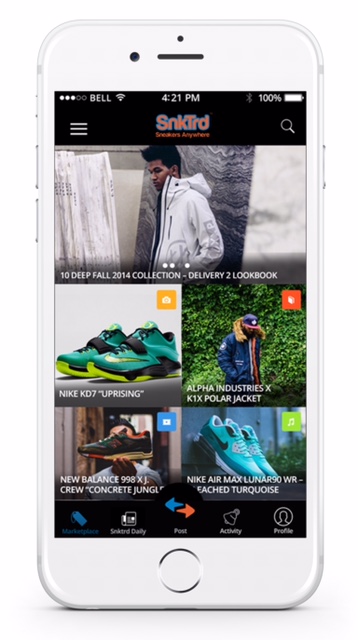
Speaking of Snktrd recently winning $20K in Miller Lite’s Tap the Future competition, how did this opportunity come about and how did you prepare?
I was scrolling through Instagram one day and came across a post about the competition, and I applied. I apply to competitions pretty often, and I’ve become immune to rejection or not hearing a response. So when they contacted me a few months later, I was excited. Presenting is my strong point, so I used these skills to prepare an outline of major points that I wanted to cover during the live pitch portion of the competition, which did not allow for the use of mobile devices during presentation. A total of 2,500 teams applied, which was narrowed down to 25 teams broken into 5 regions. Those 25 teams were then narrowed down to 5 teams, and those 5 teams traveled to Chicago to present to major corporations for $200K. They then invited us back out to Chicago, which is where it was announced that Snktrd won the $20K.
You are currently working full time, going to school, and managing your own company. How do you do it?
By not getting any sleep, which is fine. I don’t think I get enough sleep due to not properly managing my time. There are those times and weeks where I actually do get an adequate amount of sleep, which is due to proper time management. I keep a calendar to help me stick to a schedule and a budget. It’s really gets hard to balance all three, because there are some days that you might do really well in school and then some days you don’t. Some days I end up working on Snktrd at my job or even schoolwork at my job, but I’m blessed to have a job that allows me to sometimes do this. Although it sounds cliché,time management is the key.
How important is knowledge sharing to you?
I feel that it is extremely important to have people to give you constructive criticism. Receiving criticism was really hard for me, because initially it’s your friends and family critiquing you, and of course they all love you idea. I remember the first real piece of constructive criticism I received was from my SCORE mentor. He was very straightforward in telling me that he didn’t think Snktrd would work. This was the first time that someone actually told me that Snktrd was going to fail. I was not offended by his criticism, but it made me realize that sometimes the best criticism is negative criticism. I can hear “yes’s” all day, because I know Snktrd is a good idea, but I want to hear from the devil’s advocate. Knowledge sharing is so important, because you need those people that are going to poke at your ideas and give constructive criticism.
Where do you hope to be both professionally and personally in the next five years?
Managing a tech startup with $40-$50 million in revenue with over one million users. Guiding this company to an ipo, exit, or acquisition.
What obstacles have you faced so far? How did you overcome them?
Funding and marketing the site. This may be due to how much money it takes to market a business. Also, getting people to write about Snktrd. You can send out the perfect press kit and no one will respond. I rectify this by entering as many business plan competitions as possible and making sure that I am maximizing what I am currently using.
What advice do you have for someone looking to start their own company?
Be okay with failure. If your idea doesn’t work are you okay with moving on to the next venture. If you are terrified of failure, it will make you spend terrified, act terrified, and you won’t fully embrace the idea and make those sacrifices for something that you are not 100% passionate about. Be okay with the possibility of giving your all and it not working out, but being determined enough to move on despite.
What keeps you motivated?
I’ve invested so much into Snktrd that it has to work. Not only time and money, but I’m just fascinated with the idea of creating brand and being able to support myself off of what I’ve created.
How have you been able to grow as an individual?
I’ve become better with managing my time and money, because owning a business forces you to. It hurts to receive money as a business and have to ask yourself where did it go because you didn’t manage it correctly.

What has been your proudest moment as CEO?
Winning the ‘Tap the Future Contest.’ I say that because it was not only the fist time that I’ve received that much money for my business, but it was confirmation. Me presenting my business idea to someone else, and having them agree with it being a good idea is one of the best feelings. It’s one thing to agree, but it’s another to agree and put money behind what you are agreeing to.
What does success mean to you?
To put forth a goal and execute it. I think that success is a byproduct of money, but money is not the end goal.
How important is mentorship to you?
Extremely important. I think that if someone has been someplace that I am trying to go, then they have to have advice that I need to hear. Early on I didn’t reach out to people for help, not because I didn’t need them, but because I didn’t know how to. I never had mentor so I didn’t know how to interact with someone I felt could be a potential mentor. I think that it is important to have someone to guide you and warn you of issues and problems to avoid.
Best piece of advice you’ve received so far?
One is making sure that you choose your co-founders wisely, because it is like a marriage. You can’t choose someone based on the fact that they are your friend, popular, or even the fact that they are good at math so that makes them a CFO. Make sure you have a room full of smart that challenge you and not a room full of of talented “yes men.” Lastly, always keep a lot of people in the stable. Don’t become so dependent on having one person for one job, but have several people who are able to do that job. This allows you to be more flexible and not heavily relying on one individual for everything.
Thomas Mitchell is Black to Business…
What does being black in business mean to you?
Being black in business means setting an example. I think providing a clear example/benchmark for others interested in entrepreneurship in my community is something that has to be engrained in our culture. I think we often get stuck in the “crab in the barrel” mentality, and we get something and then we hold it. “I’m only going to work with you when you get to this level,” and I’m here to change that. I am willing to help cultivate that by taking black businesses to the next level and breaking down some barriers. Whether it’s the company size growth that I manage or the overall net worth, I want to be known for helping to create other entrepreneurs.
What would you tell your 23 yo self?
Hurry up with that business plan and focus.
Favorite quote?
Money in the hands of a fool is soon departed.
Message to my young brothers:
Find a problem, and build your business around solving that problem. And don’t always confuse negative criticism with constructive criticism. Everyone is not a hater, and most people are just trying to help.

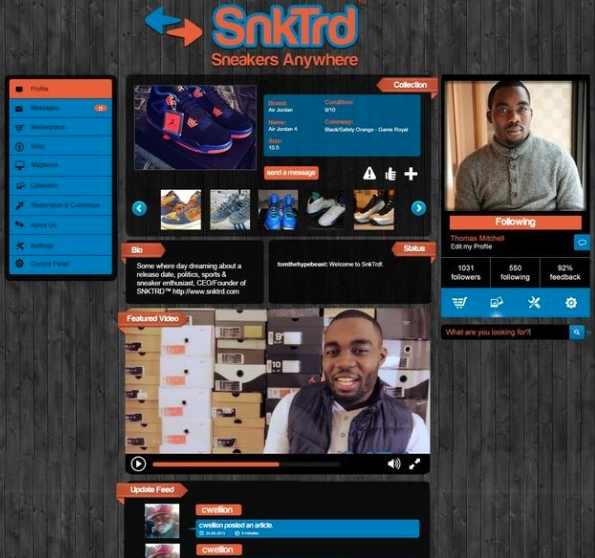
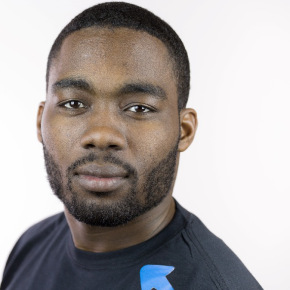
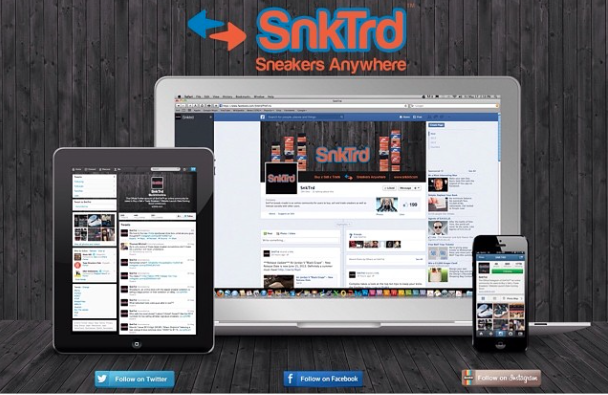

Hi, Mr. Mitchell I am contacting you personally to be able to have a chance to speak to you one on one when you get a chance can you view my email and get in contact with me when you can.
Thank you!